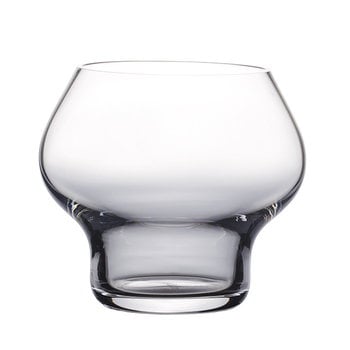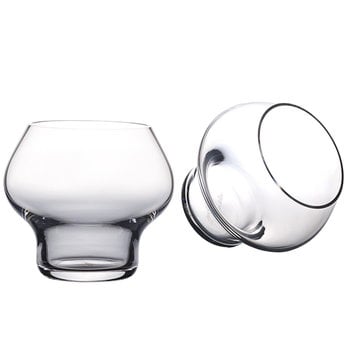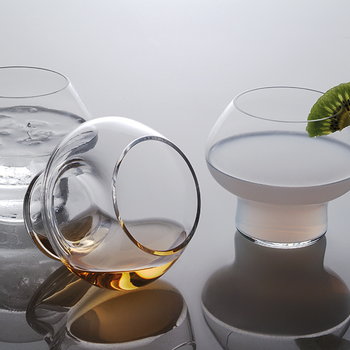The Spring glasses by Architectmade catch the eye with their fluid, sculptural shape. Designed by Jørn Utzon, the mouth-blown glasses are just as well suited for water as they are for serving cocktails or cognac.
Spring glasses, set of two
Architectmade
Description
The Spring glasses by Architectmade catch the eye with their fluid, sculptural shape. Designed by Jørn Utzon, the mouth-blown glasses are just as well suited for water as they are for serving cocktails or cognac.
Product details (6)
- Material
- Glass
- Colour
- Clear
- Height
- 8 cm
- Diameter
- 9 cm
- Capacity
- 20 cl
- Care instructions
- Dishwasher safe
- Product ID
Designer
Jørn Utzon (1918-2008) was a Danish architect, best known for designing the Sydney Opera House in Australia. Utzon attended the Royal Danish Academy of Fine Arts from where he gratuated in 1942. During the following years he worked also at Alvar Aalto's office, learning more about functionalism and aesthetics. Utzon won the architecture competition for Sydney Opera House in 1957.
Utzon often referred to the Swedish architect Erik Gunnar Asplund along with Alvar Aalto and Frank Lloyd Wright as his architectural kin. After travelling through Europe, the United States and Mexico, Utzon established his own practice in Copenhagen, working mainly as an architect throughout the world. In 2003, he received the Pritzker Prize, architecture's highest honor.
View all productsReviews (0)
Sustainability
The Product Sustainability Framework, our criteria of sustainable design, helps you find the most sustainable products in our selection. Read below which sustainability criteria this product has met.
Working conditions & labour 7/9
-
Equal opportunities for all employees
-
Commitment to UN Global Compact, fair compensation for all employees
-
Corporate responsibility requirements defined and communicated for suppliers
-
Systematic work for improved inclusion and well-being in the workplace
-
Transparent supply chain
-
Suppliers' compliance to a code of conduct ensured
-
Compliance to the UN Guiding Principles on Business and Human Rights ensured in the supply chain
-
Direct suppliers audited and certified
-
Support for community involvement in the supply chain
Eco-friendly production 9/9
-
Fair and resource-wise water-use in production
-
No incineration or landfilling of returned items
-
No use of endangered species as materials
-
No direct environmental emissions or waste (excl. GHGs) from production
-
The sustainability of direct suppliers' production is addressed and monitored
-
Production and material sourcing that respect biodiversity, animal rights, and natural ecosystems
-
Material-efficient and ecological packaging
-
Positive impact on nature’s well-being through operations that regenerate natural ecosystems
-
No potentially harmful chemicals used in own production
Climate impact 5/8
-
Company's direct greenhouse gas emissions identified and commitment to reduction
-
Product's carbon impact identified and commitment to reduction
-
Guidance on energy- and eco-efficient use of the product
-
Contribution to climate initiatives beyond the brand’s direct operations
-
Low-carbon or compensated transportation
-
Carbon footprint of the product calculated and goals set to reduce it
-
100 % renewable energy in own production and operations
-
Carbon neutral or carbon negative product
Sustainable materials 6/6
-
Sustainable and long-lasting material choices
-
No harmful or hazardous substances
-
Responsible raw material sourcing and production
-
Materials suited for circularity: monomaterials, recyclable finishings, renewable or recycled contents etc.
-
Ecological materials: natural, biodegradable, recyclable or recycled contents
-
Outstanding materials in terms of innovativeness, responsibility, sustainability and circularity: local production or sourcing, 100 % recycled content, C2C-certification etc.
Circular design 5/5
-
High aesthetic quality promoting long-term use of the product
-
Technically durable product design and material choices
-
Design for enduring life-long quality
-
Design and support for product maintenance, repair and upgradability
-
Innovative circular design solutions: circular service system, resale platform, remanufacturing, collection of used products, etc.

















